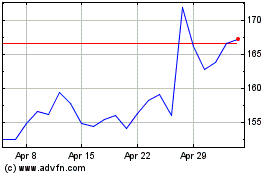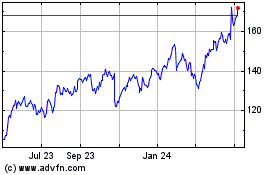Waymo Adds $750 Million to War Chest as Driverless Cars Prove Tough to Deploy
May 12 2020 - 12:29PM
Dow Jones News
By Tim Higgins
In the world of driverless cars, the big keep getting
bigger.
Waymo LLC has raised a further $750 million, pushing the total
outside investment the company has announced in the past two months
to $3 billion and bolstering its financial war chest at a time when
the coronavirus pandemic has created new uncertainty in the race to
develop self-driving vehicles.
The announcement on Tuesday by the unit of Google-parent
Alphabet Inc. is part of a broader trend in the autonomous vehicle
industry where eye-popping investments are going to big companies
rather than unproven startups as the artificial intelligence
technology has proven harder to deploy than expected five years
earlier.
Waymo on March 2 said it had raised $2.25 billion through its
first external fundraising effort to help deploy the company's
fifth-generation sensor system as well as ramp up a goods-delivery
service. Waymo suggested then it would be adding to the total
raised.
Chief Executive John Krafcik said about the latest fundraising
that the extra money wasn't spurred by pandemic concerns.
Rival General Motors Co.'s Cruise self-driving unit has raised
more than $7 billion, including from Honda Motor Co., while Ford
Motor Co.'s bet on driverless startup Argo AI attracted a new
investor last summer, Volkswagen AG, with a commitment to invest
about $2.6 billion.
To be sure, some startups have been able to attract sizable
investments, but they often have high-profile founders who left big
projects, such as Google's self-driving car project that has
evolved into Waymo.
Some self-driving car efforts have faltered, though. On March
19, Stefan Seltz-Axmacher, co-founder of an autonomous trucking
startup called Starsky Robotics, which had received a lot of
attention, described in a Medium post the challenges he faced and
why his company folded.
"The space was too overwhelmed with the unmet promise of AI to
focus on a practical solution," he wrote. "As those breakthroughs
failed to appear, the downpour of investor interest became a
drizzle."
Waymo's Mr. Krafcik said the increase in investor dollars to
larger players like his company demonstrated how hard the
technology is to realize. "There used to be an expression...you
could get a group of grad students together, a couple of six-packs
of beer and put together a [driverless car] demonstration that
might be worthy enough to attract money from investors. It's a very
different world right now," he said, saying each milestone of
development since the team began work in 2009 has only proven more
complex.
"It takes more and more resources, more and more cash, more and
more software resource and more and more hardware expertise," he
said.
Still, some major investors see potential in the technology.
Waymo said it raised the additional money from investors including
Perry Creek Capital and units of T. Rowe Price Group Inc. and
Fidelity Investments.
As auto and tech companies around the world try to work through
the ramifications of the coronavirus, it isn't clear how driverless
car programs might be affected. Last month, Ford said it was
postponing its driverless vehicle service to 2022 from 2021 and
rethinking its strategy.
Ride-hailing companies Uber Technologies Inc. and Lyft Inc. this
month both reaffirmed their interest in autonomous driving
technology, even after announcing big job and cost cuts to deal
with the financial repercussions of lower ridership during the
pandemic.
Write to Tim Higgins at Tim.Higgins@WSJ.com
(END) Dow Jones Newswires
May 12, 2020 12:14 ET (16:14 GMT)
Copyright (c) 2020 Dow Jones & Company, Inc.
Alphabet (NASDAQ:GOOGL)
Historical Stock Chart
From Mar 2024 to Apr 2024

Alphabet (NASDAQ:GOOGL)
Historical Stock Chart
From Apr 2023 to Apr 2024
